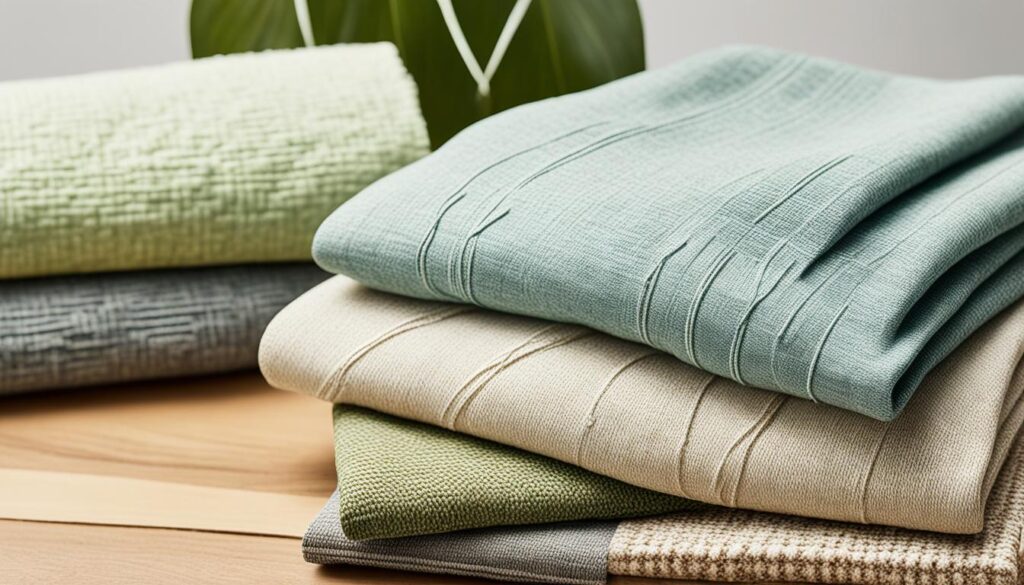In a world where fashion trends come and go, there is a growing movement that seeks to combine style with sustainability. It’s called Eco Chic. More and more people are becoming conscious of the environmental impact of their choices and are embracing eco-friendly practices in both fashion and home decor.
Imagine Sarah, a young professional with a passion for fashion and a love for the environment. She wants to dress stylishly but also wants to make a positive impact on the planet. As she explores different options, she discovers the concept of Eco Chic. This trendy movement offers a way for Sarah to express herself through fashion while staying true to her values.
To Sarah’s delight, she finds that eco chic goes beyond just clothing. It extends to home decor as well, allowing her to create a sustainable and stylish living space. From sustainable fabrics to ethical production practices, eco chic offers a wide range of options for those who want to embrace a greener lifestyle.
Excited about this new discovery, Sarah shares her findings with her friends and family. Together, they explore eco chic brands, discovering the beauty of sustainable fashion and home decor. They realize that by supporting ethical brands and choosing eco-friendly alternatives, they can contribute to a more sustainable future for both the fashion industry and their homes.
Are you also interested in making a positive impact on the environment without compromising on style and quality? Join Sarah and countless others in the eco chic movement as we embrace trendy sustainability in fashion and home.
Key Takeaways:
- Eco Chic is a growing trend in fashion and home decor that focuses on sustainability and eco-friendly practices.
- People are becoming more aware of the environmental impact of their choices and are seeking stylish and ethical alternatives.
- Eco Chic combines style and sustainability, allowing individuals to make a positive impact on the environment through their fashion and home choices.
- Sustainable fabrics, ethical production practices, and eco-friendly materials are essential elements of the eco chic movement.
- By supporting ethical brands and choosing eco-friendly options, individuals can contribute to a more sustainable future for the fashion and home sectors.
Embracing Eco Chic: The Influence of Sustainable Fashion
As awareness of the environmental impact of fast fashion grows, there is a rising demand for sustainable clothing options. People are realizing the detrimental effects that the fashion industry has on the planet, from excessive carbon emissions to water pollution. In response to these concerns, eco chic has emerged as a powerful movement that combines style and sustainability.
Eco chic is reshaping the fashion industry by encouraging designers and brands to embrace eco-friendly materials, ethical production practices, and timeless designs. The focus is on creating clothing that not only looks good but also minimizes harm to the environment. Sustainable fashion has become a core value for many individuals who want to promote conscious consumption and reduce the exploitation of resources.
Designers and brands are taking innovative approaches to incorporate sustainability into their collections. They are utilizing eco-friendly materials such as organic cotton, hemp, and recycled fibers. By embracing natural and biodegradable materials, fashion brands are reducing their reliance on non-renewable resources and reducing waste generation. This shift towards sustainable materials not only benefits the environment but also enhances the quality and durability of the clothing.
Moreover, ethical production practices have become a cornerstone of sustainable fashion. Brands are recognizing the importance of transparency in their supply chains, ensuring fair trade, and providing safe working conditions for their employees. By embracing ethical production practices, brands can guarantee that their products are made without exploiting workers or contributing to the perpetuation of unfair labor practices.
“Sustainable fashion is not just a trend; it’s a mindset shift towards more responsible and mindful choices. Embracing eco chic allows us to align our personal style with our values, creating a positive impact on both the fashion industry and the environment.”
The influence of sustainable fashion goes beyond the individual. It has sparked a broader movement that encourages consumers to be more conscious of their choices and demand change from the fashion industry as a whole. By supporting sustainable fashion brands and embracing eco chic, individuals can contribute to a shift towards a more ethical and sustainable future.
The Rise of Sustainable Fabrics and Materials
The fashion industry is undergoing a significant transformation as it embraces the growing demand for sustainability. One key aspect of this shift is the rise of sustainable fabrics and materials, which are eco-friendly alternatives to traditional textiles.
Sustainable fabrics and materials come in various forms, including recycled fibers, plant-based fabrics, and biodegradable materials. Recycling processes extract fibers from discarded clothing and textiles, transforming them into new fabrics. This minimizes waste and reduces the need for resource-intensive production methods.
Plant-based fabrics, such as organic cotton, hemp, and bamboo, are gaining popularity due to their lower environmental impact. These natural fibers require less water and fewer chemical inputs during cultivation compared to conventional cotton. Additionally, they offer excellent breathability and durability, making them ideal for sustainable fashion.
Another exciting development is the utilization of biodegradable materials in fashion. These materials, typically derived from plant starches or cellulose, can naturally decompose at the end of their life cycle, minimizing their impact on landfill waste. This innovation aligns with the principles of circularity and resource conservation.
Brands that embrace sustainable fashion are incorporating these innovative fabrics and materials into their collections. They prioritize eco-friendly options without compromising on style and quality. By choosing sustainable clothing made from these materials, consumers can support ethical and eco-friendly practices while looking fashionable.

By utilizing sustainable fabrics and materials, the fashion industry can address critical environmental issues such as resource depletion, pollution, and waste generation. The adoption of these eco-friendly alternatives promotes circularity, reduces the industry’s carbon footprint, and safeguards natural resources for future generations.
The Future of Sustainable Fashion: A Quote from Fashion Designer Jane Smith
“Sustainable fabrics and materials are the foundation of a more responsible fashion industry. They allow designers to create beautiful, eco-friendly garments without compromising on style. It’s a win-win for both fashion-conscious consumers and the environment.”
The incorporation of sustainable fabrics and materials represents a significant step towards building a more ethical, eco-friendly, and stylish fashion industry. As more brands join this movement, the positive impact on the environment will continue to grow, paving the way for a future where fashion and sustainability coexist harmoniously.
Ethical Production Practices: A Cornerstone of Sustainable Fashion
Ethical production practices form an essential foundation for sustainable fashion. In response to the growing demand for eco-friendly and socially responsible clothing, brands are increasingly prioritizing transparency in their supply chains, fair trade, and safe working conditions. These practices enable consumers to make informed choices that align with their values and support ethical and sustainable practices within the fashion industry.
Transparent supply chains are a crucial aspect of ethical production practices. By providing visibility into the journey of a garment, brands empower consumers to understand the environmental and social impact of their purchases. This transparency allows individuals to support brands that prioritize sustainable sourcing, responsible manufacturing, and ethical labor practices.
“By embracing transparency in their supply chains, brands enable consumers to make conscious choices and actively participate in the sustainability movement.”
In addition to transparency, fair trade practices are vital for sustainable fashion. Fair trade certification ensures that workers receive fair wages, have safe working conditions, and are free from exploitation. This certification supports sustainable livelihoods for workers and promotes ethical treatment throughout the entire production process.
Brands are also placing significant emphasis on safe working conditions and compliance with labor regulations. By providing a safe and supportive environment for workers, these brands protect individuals’ rights and well-being. Compliance with labor regulations further reinforces ethical production practices, fostering a culture of respect and promoting social sustainability within the fashion industry.
The Impact of Ethical Production Practices
Embracing ethical production practices in sustainable fashion has far-reaching impacts. Beyond supporting the well-being of workers and ensuring fair trade, these practices contribute to a more sustainable future for the fashion industry as a whole. By reducing exploitation and promoting responsible manufacturing processes, ethical production practices address social and environmental challenges.
Integrating eco-friendly materials with ethical production practices is essential for achieving comprehensive sustainability in fashion. Through such integration, brands can create garments that are not only environmentally friendly but also socially responsible. Sustainable fashion encompasses the entire lifecycle of a product, from sourcing materials to manufacturing and distribution.
| Benefits of Ethical Production Practices in Sustainable Fashion |
|---|
| Promotes transparency and informed consumer choices |
| Supports fair trade and sustainable livelihoods |
| Fosters safe working conditions and compliance with labor regulations |
| Reduces exploitation and unethical labor practices |
| Addresses social and environmental challenges in the fashion industry |
| Contributes to the overall sustainability of the fashion industry |
Ethical Brands You Can Trust
Eco Stylist, a platform that certifies brands based on their commitment to sustainability and ethical practices, showcases ethical brands that consumers can trust. These brands prioritize transparency, fair labor practices, and sustainable production methods. By choosing clothing from these brands, consumers can make a positive impact on the environment and support a more conscious fashion industry. Ethical brands play a crucial role in the eco chic movement and offer stylish options that align with consumers’ values.
| Brand | Ethical Practices |
|---|---|
| Patagonia | Patagonia is committed to using organic and recycled materials, fair trade practices, and reducing their carbon footprint. |
| Everlane | Everlane focuses on transparency and ethical production, providing detailed information about their factories and pricing. |
| Reformation | Reformation uses sustainable materials and production methods, as well as supporting fair wages and safe working conditions. |
| People Tree | People Tree is a pioneer in fair trade fashion, working with artisans and farmers to create sustainable and ethical clothing. |
| Veja | Veja prioritizes transparency and sustainability in their production, using eco-friendly materials and supporting fair trade practices. |
Conclusion
Eco chic is a powerful movement that combines style with sustainability in the fashion and home sectors. By embracing eco chic, individuals can make a positive impact on the environment and support a more ethical and conscious industry.
From the use of sustainable fabrics and materials to the implementation of ethical production practices, eco chic offers a wide range of options for those who want to embrace a greener lifestyle. Choose clothing made from recycled fibers or plant-based fabrics, and support brands that prioritize transparency, fair labor practices, and sustainable production methods.
By opting for eco-friendly alternatives, we can create a more sustainable future for fashion and home decor. Together, let’s strive for a world where eco chic is not just a trend but a way of life, where style and sustainability coexist harmoniously, and where every choice we make contributes to a better planet.

